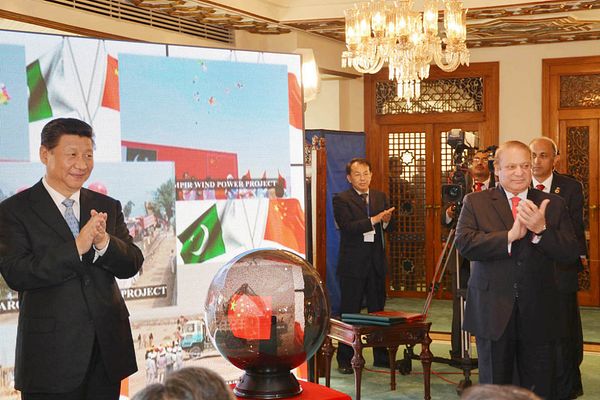Defaulting Pakistan Reduces The Momentum Of The CPEC

The China-Pakistan Economic Corridor (CPEC) initiative, which was launched ten years ago, was seen as a sign of Pakistan’s future prosperity. Seven years later, however, many of the CPEC’s projects are still on hold, and even those that are currently functioning have liabilities and are losing money.
When it was thought that China’s ambitious CPEC project would be able to create jobs and growth in Pakistan, it was flawed from the start.
While China had its own plans to use the CPEC project to bypass the Straits of Malacca between Malaysia and Indonesia and meet its energy requirements, Pakistan was constantly battling internal horrors like blasphemy-related lynchings and overly zealous “jihadi” groups.
Since the CPEC project’s inception, a small number of local organizations have begun to oppose it, and the project itself has struggled with a shortage of skilled laborers.
Pakistan’s education system is in disarray and produced low-quality human resources. Graft has served as the cornerstone of Pakistan’s CPEC negotiations. Involved officials and businesses got kickbacks, and everything was disregarded without any secrecy in the name of national security.
The media regularly highlights the ongoing conflicts between the locals and the Chinese employees. While the locals are in fear, a special force of 10,000 has been sent to safeguard Chinese workers in Pakistan.
The CPEC project has lost all momentum since Pakistan proclaimed itself bankrupt. China is aware that Pakistan is moving in Sri Lanka’s direction and that any moment the situation is unstable, the public could erupt.
Even fundamental necessities like wheat and cooking gas have become difficult to come by for the average Pakistani. The notorious wheat crisis of Pakistan was primarily brought on by the conflict between Ukraine and Russia, poor distribution, and wheat smuggling to Afghanistan.
China is said to hold roughly $30 billion of Pakistan’s $126 billion in total external foreign debt, according to the International Monetary Fund (IMF). This amount is more than three times the IMF’s debt of $7.8 billion and more than Pakistan has borrowed from the World Bank and Asian Development Bank combined.
When Islamabad pleaded with Beijing to cancel its $3 billion in debt obligations to China-funded energy initiatives set up under the CPEC, the clear answer was no.
As it has done to many other lesser nations, China was able to seduce Pakistan, a struggling nation, into falling into its debt trap earlier. More than $19 billion of Pakistan’s invested in plant debt is due for the construction of independent power producers (IPPs) under take-or-pay power generation contracts.
Pakistan’s dependable friend On the pretext that its illustrious banks, including China Development Bank and the Export-Import Bank of China, were unable to modify any of the terms of the earlier agreement reached with the government, China refused to budge on Islamabad’s request to renegotiate the power purchase agreements worth $3 billion.
Pakistan is reeling under intense strain and has gotten itself into trouble with $294 billion in debt obligations, which ironically amounts to 11% of its GDP.
Beijing is in financial trouble and unable to take out financing for infrastructure.
Shehbaz Sharif, the prime minister of Pakistan, traveled to Beijing to meet with Chinese leaders and request a rollover of $6.3 billion in debt. China is said to have given its approval, prompting Sharif to publicly declare that over $4 billion in debt would be revised; however, these were only talks, and nothing actually ever materialized.
However, not only CPEC has suffered; but relations between China and Pakistan are also deteriorating. China’s silence against India’s decision to bar Pakistan from a high-level meeting that would have served as a virtual BRICS summit with other developing countries is a new observation.
According to experts, China is now wary of Pakistan’s instability, which has endangered the possibilities of its CPEC project moving forward.
Being a capitalist country, China has instructed its businesses to engage in Pakistan solely for financial gain and to advance the CPEC project.
However, China has expressed annoyance over the numerous recent attacks in Pakistan on Chinese citizens. When he last met his Pakistani colleague, President Xi Jinping also voiced his deep concern for the safety of Chinese nationals in Pakistan.
China is conscious that recent negotiations with the International Monetary Fund to release additional funds failed and is closely monitoring Pakistan’s deteriorating situation.
Pakistan has a past of military takeovers and extremists influencing important political decisions. This frequently led to significant CPEC transactions that were discovered to be fraudulent being put on hold.
Growing US-India security ties are the only factor keeping China-Pakistan relations and the CPEC dream alive. China is engaged in a heated trade dispute with the US while also preparing to provide armed support to Russia, the US’s main adversary.
Beijing is aware that it is now overly reliant on China for economic and military support and can no longer rely on the United States for financial support.
News Mania Desk






